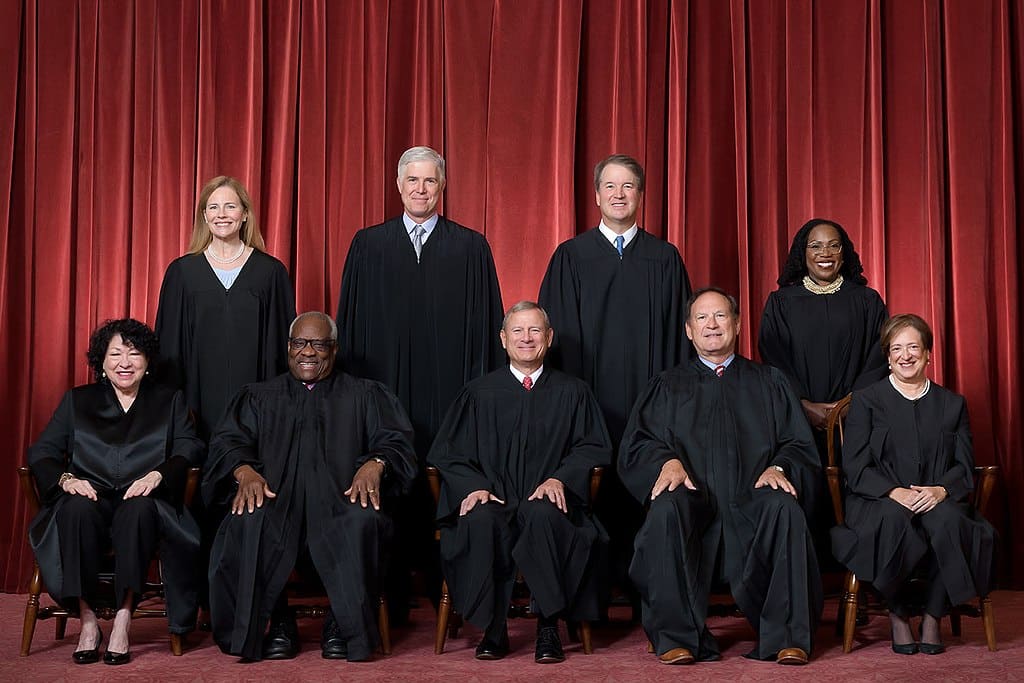Senate Judiciary Chair Dick Durbin (D-IL) said this week that his committee was “going to produce a bipartisan code of ethics” for the Supreme Court. But given the recent string of reporting about questionable behavior by some of the Justices, would such a formal code have real teeth in practice?
Several Ethics Proposals “On the Table”
Durbin noted during an interview Monday that there were several bipartisan proposals “on the table” to formalize the Court’s ethics.
For example, under one proposal the Supreme Court would have to establish a code of conduct with rules published on its website, designate an official to handle violations, and publish an annual report on any complaints and actions taken.
Chief Justice Declines Senate Invite
Durbin’s remarks came one day before the Senate Judiciary Committee held a hearing on the Supreme Court’s ethics rules.
The Judiciary Chair had invited Chief Justice John Roberts to testify, but he replied last week that he would “respectfully decline” the offer, citing “the importance of preserving judicial independence.”
Attorney: Justices are Bound by Rules
The U.S. Supreme Court is virtually the only court in the country without a formal code of ethics. However, attorney Robert Schalk tells Political IQ that the Justices are still bound by ethics codes by which all lawyers are bound.
“I believe all justices would adhere if the Senate were to implement further obligations out of respect for the rule of law and fear of losing a lifetime appointment,” Schalk said in an email.
The Ethics in Government Act of 1978 mandates that all public officials—including the Justices—and their immediate families publicly disclose financial records and employment histories. It also sets restrictions on lobbying efforts for a period of time after an official leaves public office.
Recent Reporting Raises Questions
Yet Roberts’ response to Durbin came amid emerging reports of undisclosed business dealings with his wife Jane and an attorney who’s had business before the Court, a failure by Neil Gorsuch to disclose the identity of another person with whom he’d done business who’s also had business before the Court, and ongoing reports related to Justice Clarence Thomas, his wife Ginni, other Thomas family members and a billionaire Republican donor named Harlan Crow.
Assertions by Republicans of questionable behavior by liberal Justices Sonia Sotomayor, Elena Kagan and Ketanji Brown Jackson would only seem to underscore the need to hold the Supreme Court to a formal ethics standard.
Can You Punish Someone With a Lifetime Appointment?
But, if the Legislative Branch of government—Congress—were to pass a formal code of ethics, what guarantee is there that the Justices would adhere to it?
Schalk says the threat of impeachment would be a real and present deterrent.
“There have only been 2 attempts ever to remove a Supreme Court Justice in US History,” he notes. “The real issue with impeachment is that then it turns what is not supposed to be a non-political position (being a judge) into a political war in the Senate with the likelihood of success being low. However, the embarrassment of articles of impeachment being filed, the possibility of unethical behavior becoming public fodder should be enough for the justices to walk the appropriate ethical line.”
In his response to Durbin, Roberts had submitted a Statement on Ethics Principles and Practices that had been signed by all nine Justices.
“It is an extraordinary document—not in a good way,” Durbin countered at Tuesday’s hearing. “It makes clear that while the Justices are fine with consulting with certain authorities on how to address ethical issues, they do not feel bound by those same authorities.”
Supreme Court Confidence at Record Lows
More than once in the past several years Roberts has found himself on the defensive, arguing on behalf of the Court’s “legitimacy.”
“If the Court doesn’t retain its legitimate function of interpreting the Constitution, I’m not sure who would take up that mantle. You don’t want the political branches telling you what the law is, and you don’t want public opinion to be the guide about what the appropriate decision is,” Roberts said during a September interview.
Public opinion of the Supreme Court has, in fact, plunged to historic lows in the past year, with just 25% of those Americans surveyed by Gallup saying they had confidence in the Supreme Court—down from 36% a year earlier and down five percentage points from the previous low recorded in 2014.
This week, a new survey by the Democratic pollster Navigator found that 44% of Americans held a favorable view of the Supreme Court while 48% held an unfavorable view.
That unfavorable number has increased since June when the Court’s 6-3 conservative supermajority overturned Roe v Wade and the Constitutional right to abortion, at which point its favorable rating began dipping below 50%.


